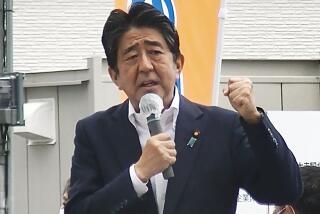The Zimbabwe solution
- Share via
Elections in benighted Zimbabwe have produced three big surprises. The first is that 84-year-old President Robert Mugabe dared to hold them at all. After 28 years in power, Mugabe has beaten a prosperous country into ruin. Once a food exporter, Zimbabwe is hungry, inflation is running at 200,000% and rising, unemployment is at 80% and life expectancy has plummeted. Even so, most expected Mugabe to succeed in rigging the presidential and parliamentary elections to secure himself another term. The second surprise is that even his iron control of the security forces (and truckloads of food delivered to voters) apparently didn’t do the trick. The opposition claims victory. That’s plausible, though impossible to verify until the election commission announces final results.
The biggest surprise of all is that Mugabe has not declared himself the winner. Rather, he has reportedly rejected a runoff election, required by the constitution if no candidate garners 51% of the vote, as too humiliating. Unconfirmed and sometimes conflicting reports suggest that Mugabe’s forces are negotiating with the opposition for a power-sharing agreement that would guarantee the president immunity from prosecution if he retires.
However unseemly the prospect of one of Africa’s worst strongmen escaping accountability, Zimbabwe’s best hope lies in retiring Mugabe and his entourage to a luxurious villa outside the country; Namibia is often mentioned. But getting him there will require international tact. For the British, in particular, mum’s the word. Each time Whitehall condemns Mugabe, it gives him occasion to charge Britain with trying to reimpose colonial imperialism. Instead, the international community could quietly signal that if power-sharing negotiations are occurring, the world will support any peaceful settlement and work with the victors to rebuild the shattered country. If talks fail -- or if no offer of immunity or refuge is forthcoming -- Mugabe might well cling to power and order the military into the streets. Bloodshed could ensue. We’ve seen this movie before, most recently in Kenya, and the atrocities that followed will haunt that nation for years to come. Zimbabwe is not plagued by Kenya’s deep ethnic divisions. There is still time to prevent violence.
In the long run, the only solution to Zimbabwe’s agony is good governance. Whether Mugabe departs gracefully or dies in office years from now, Zimbabwe will need international help to end the culture of kleptocracy and to learn from bitter experience how better to govern itself.
More to Read
Sign up for Essential California
The most important California stories and recommendations in your inbox every morning.
You may occasionally receive promotional content from the Los Angeles Times.












